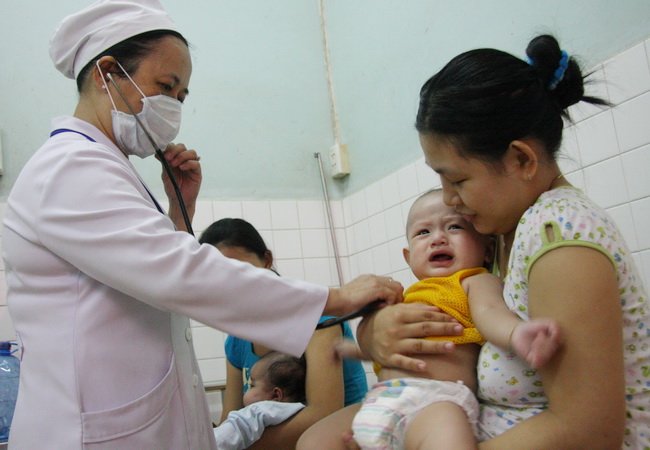At least fifty-three children have been taken to hospital for health problems, mainly high fever, after being vaccinated with Quinvaxem, which has been put back into use after five months of suspension for safety verification.
>> 27 children hospitalized after Quinvaxem vaccination >> Quinvaxem to be re-used after 5-month suspension >> Vietnam suspends Quinvaxem vaccine following 9 deaths
Of these children, 32 were in Tien Giang and the rest were in Kien Giang and Ba Ria-Vung Tau provinces. These three provinces are among the 12 provinces where the National Extended Vaccination Program (NEVP) was implemented during the past two days, October 25-26. The Health Ministry decided yesterday that the vaccine will continue to be used, as the rate of children with post-vaccination responses were of an acceptable number by the World Health Organization (WHO), Le Hoang San, deputy head of the Ho Chi Minh City Pasteur Institute, told Tuoi Tre. Yesterday, San arrived in Tien Giang, the province with the highest number of children hospitalized after vaccination, to examine the situation. Among the children with health problems after vaccination in Tien Giang’s Cai Lay District, 1.33 percent had a fever above 38 degree Celsius (WHO limit: 23.7 percent); 0.66 percent suffered from vomiting (WHO limit: 0.8 percent); 0.28 percent suffered from diarrhea (WHO:1.5 percent); 0.44 percent responded with prolonged crying (WHO: 1.5 percent), etc., San reported. When injected into a person’s body, vaccines can cause a variety of responses, mainly fever, San said. He added that after being imported into Vietnam, Quinvaxem was tested in Long An province and proved to be safe; the Health Ministry then decided to use it widely. After many children responded negatively to the vaccination, the Tien Giang Health Department consulted the Ho Chi Minh City Pasteur Institute and decided to halt the vaccination program in Cai Lay on October 25 while continuing the program in other districts in Tien Giang with closer supervision, said Tran Dac Phu, head of the Preventive Health Department. After that, the NEVP and the Preventive Health Department consulted the Institute and decided to continue using the vaccine in other provinces and cities, on the grounds that all post-vaccination responses continued to be common and slight. However, there have been shortcomings during vaccinations in Tien Giang, said deputy head of the Ho Chi Minh City Pasteur Institute Le Hoang San. For example, according to the ministry’s regulation, a table of vaccination is allowed to give a maximum of 50 injections during a session, so that health workers have time to give instructions and advice to parents of children during the vaccination, but many localities have violated this regulation, San said. When asked about the fact that many parents whose children have been hospitalized said that they had not been given any precautions by health workers regarding irregular responses to the vaccine, despite the fact that ministry regulations require them to do so, San said he will order examinations. “We have asked the local health authorities to check all points of vaccination to correct the shortcoming,” he said. As previously reported, Korean-made Quinvaxem is the very vaccine that was suspended by the Ministry of Health on May 4 for investigation, after nine deaths and dozens of cases of severe allergic reactions among infants were recorded from November 2012 to April 2013. After the investigation ended, the National Institute of Hygiene and Epidemiology said on September 24 that the vaccine would be used again as an investigation showed that there were no unsafe cases in relation to the use of this vaccine. According to the NEVP’s statistics, 40 percent of the responses after vaccination with Quinvexem came form unknown causes. Quinvaxem is meant to prevent five common, potentially fatal childhood diseases: diphtheria (D), tetanus (T), pertussis (P, whooping cough), hepatitis B (HepB), and Haemophilus influenza type b (Hib).























































